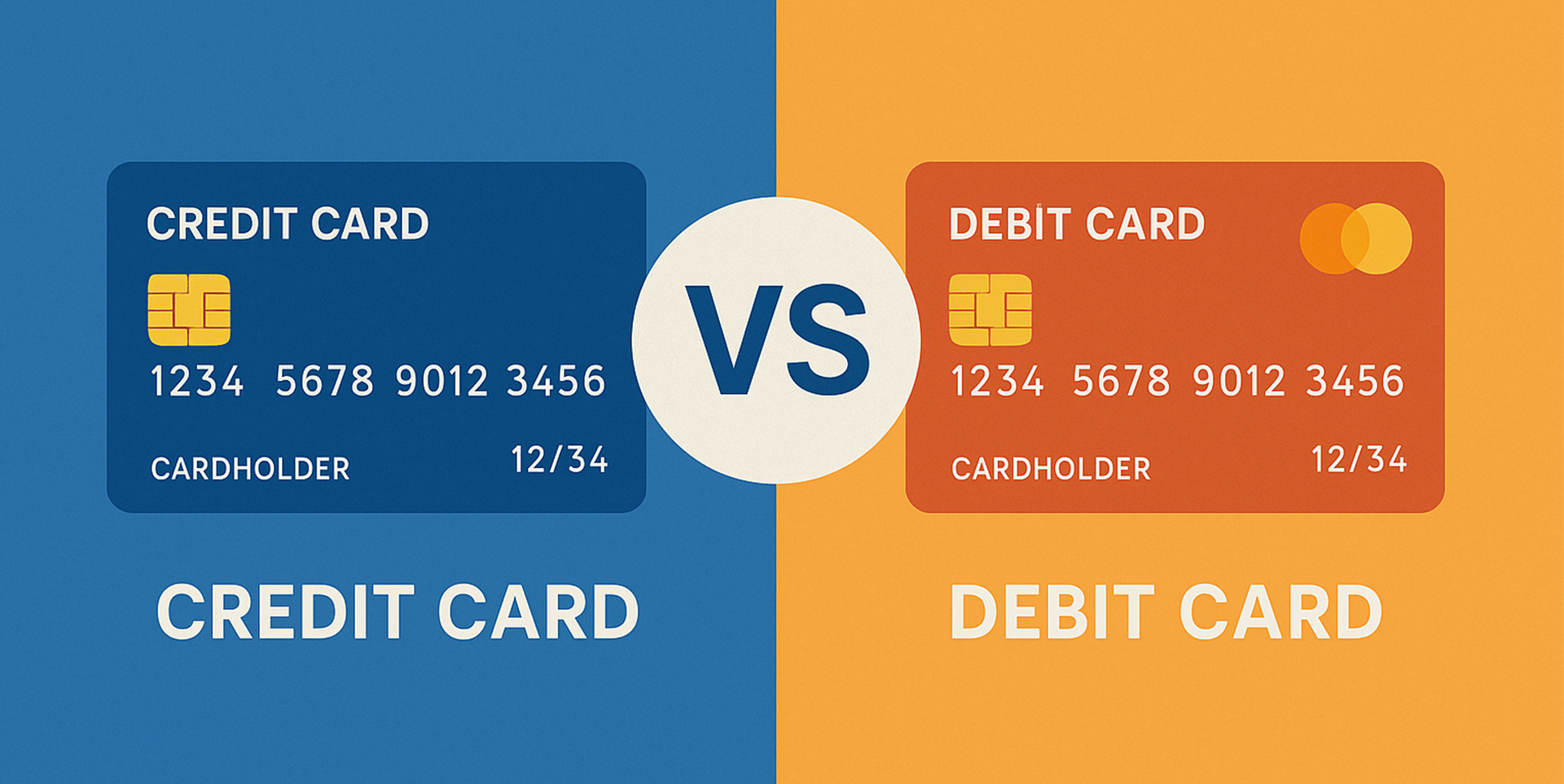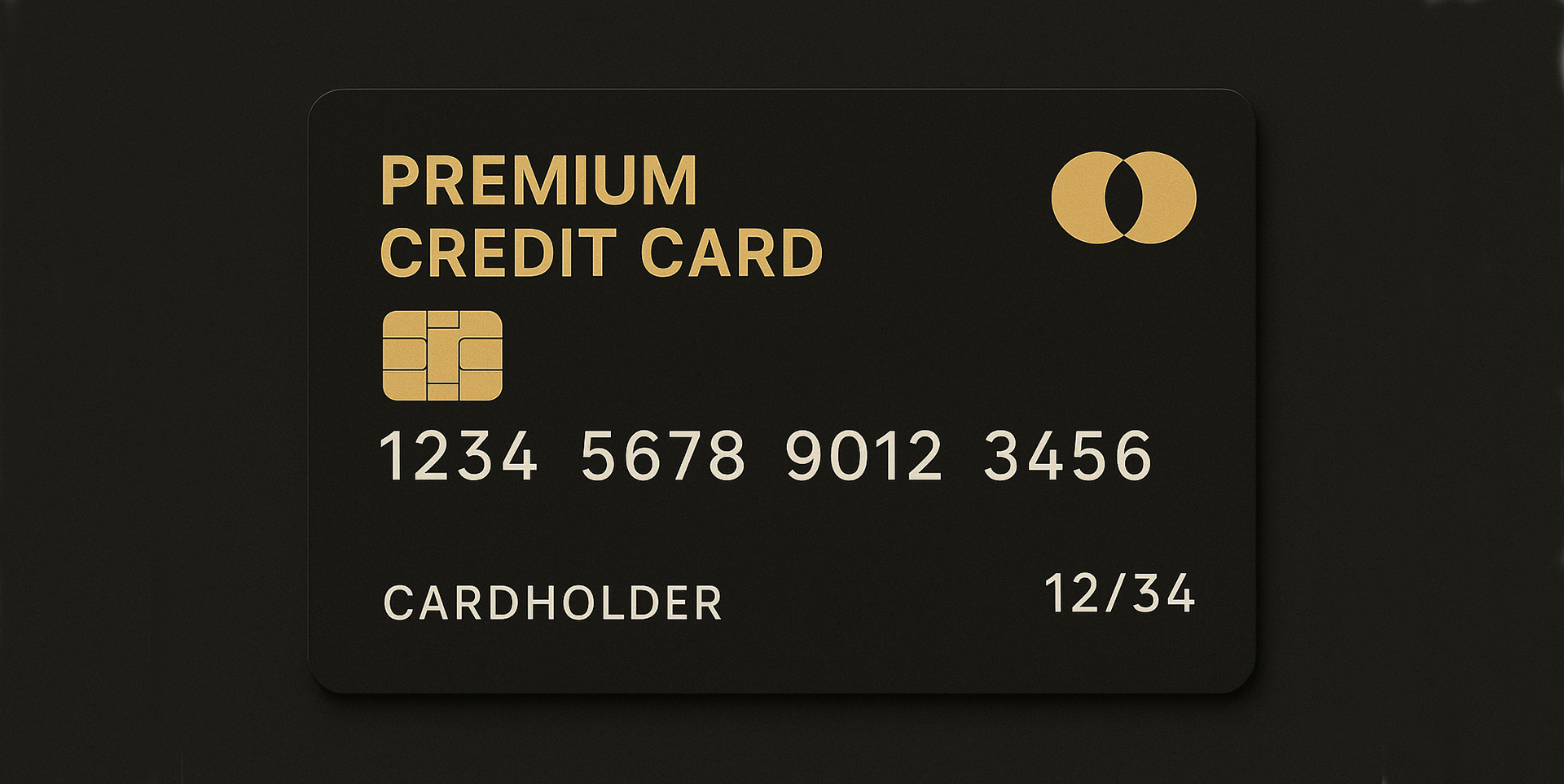The Difference Between A Credit Card And A Debit Card

Introduction
Although debit and credit cards are sometimes used interchangeably, they have important distinctions that may impact your financial status. Despite having almost the same appearance, they have magnetic strips, EMV chips, expiration dates, and 16-digit card numbers. However, there are significant differences in how they work and what advantages they provide.
Using the money you deposited at the bank, debit cards enable you to make purchases. Credit cards let you borrow money from the card issuer to make purchases or cash withdrawals up to a predetermined limit.
We'll review the main distinctions between debit and credit cards, their benefits and drawbacks, and how to pick the best one for your spending requirements.
A Credit Card: What Is It?

Up to a predetermined limit, a credit card enables you to borrow money from a financial institution—usually a bank—for purchases, balance transfers, and cash withdrawals. You are borrowing money when you use a credit card, and if you don't pay the entire amount due each month, you will be responsible for paying it back with interest. There are several different categories in which credit cards are issued:
- Standard Cards: Basic credit line with no yearly charge.
- Premium Cards: These cards provide benefits like access to airport lounges and concierge services, but they are frequently more expensive.
- Rewards Cards: Provide cash back, miles, or points for purchases.
- Balance transfer cards, which frequently have low introductory rates, assist in transferring debt from one card to another.
- Secured Cards: Demand a payment to serve as security.
- Charge cards have no monthly spending cap, but the balances must be paid in full.
By using rewards cards, credit cardholders can access cash, discounts, travel points, and numerous other benefits unavailable to debit cardholders. It is possible to apply rewards at tiered rates or a flat rate. For instance, you may have a card that gives you two miles for every dollar spent and another that gives you three miles for travel, two miles for dining, and one mile for everything else. After earning miles, you could pay them to reserve future trips.
Benefits of a Credit Card
Credit cards may have some benefits compared to debit cards but may also have drawbacks. The advantages and disadvantages of using credit cards for purchases are examined below.
Create a Credit History
Your credit report shows the use of your credit card. This covers good and bad credit histories, such as late payments or delinquencies, and positive ones, like on-time payments and low credit utilization ratiostime payments and low credit utilisation ratios. Your credit scores are then determined using the data from your credit report. A history of purchases, on-time payments, and maintaining modest card balances within their limits can help responsible spenders improve their credit scores.
Protections of Purchase and Warranty
Additionally, certain credit cards may offer warranties or insurance on purchases beyond what the brand or retailer offers. For instance, it's worthwhile to inquire with the credit card company whether they will cover a damaged item purchased using a credit card after the manufacturer's warranty ends. Additionally, you might have price and purchase protection built into help you replace lost or stolen goods or get a refund if the item you bought is cheaper elsewhere.
Protection Against Fraud
The customer's maximum culpability for purchases made after the card vanished is $50, provided they promptly report the loss or theft. Debit card users are similarly protected against loss or theft under the Electronic Fund Transfer Act, provided they report the incident within 48 hours of becoming aware. The cardholder's responsibility increases to $500 after 48 hours; beyond 60 days, there is no cap.
Additional Benefits of Credit Cards
Credit card customers can dispute purchases of damaged or lost products during shipping, as well as purchases made without authorisation under the Fair Credit Billing Act. 2. If a debit card was used to purchase the item, the charge cannot be undone unless the seller agrees. Furthermore, victims of debit card theft do not receive their money back until the investigation is finished. Moreover, victims of debit card theft do not receive their money back until the investigation is completed.
Drawbacks of Credit Card Use
Debt, effects on credit scores, and expenses are the primary disadvantages of credit card use.
Debt Can Be Caused by Spending
Using a credit card to make purchases means utilising the bank's funds, not your own. To prevent interest, this money must be paid back on schedule. At the very least, you must pay the minimum amount owed each month. Building up large amounts on several cards may burden your finances and make it difficult to make monthly payments.
Effects on Credit Scores
Maintaining low credit card balances and making on-time bill payments will improve your FICO scores. However, suppose you develop the bad habits of paying late, maxing out one or more of your cards, closing old accounts, or applying for new credit too frequently. In that case, misusing credit cards may negatively impact your credit history.
Fees and Interest
In essence, a credit card is a short-term loan. Therefore, you must repay your purchases within a specific time to avoid incurring interest. The interest rate determines your annual percentage rate (APR) and the costs that the credit institution charges. Carrying a balance from month to month will cost you extra if the card's annual percentage rate is higher.
You should know whether your card has fees for cash advances, balance transfers, foreign transactions, yearly fees, late fees, or returned payments. Generally speaking, a credit card's annual cost will increase with the quality of its rewards program and the number of incentives it provides.
Debit Cards: What Are They?

When you make a debit card transaction, money is taken straight from your savings or checking account. No borrowing is required, unlike with a credit card; if you do not have the funds in your account, the transaction might not be completed (or you might be charged an overdraft fee). When issued by major payment processors like Visa or Mastercard, debit cards provide many of the same consumer protections as credit cards and the convenience of credit cards.
Benefits of Debit Card Use
Like credit cards, debit cards can offer benefits and drawbacks.
Steer clear of debt
A debit card removes the risk of accruing debt by using funds that the user already owns. Generally speaking, using plastic results in higher spending than using cash. 4. Impulsive spenders can stay within their budget and resist the temptation of credit by using debit cards. You can avoid high-interest debt by doing this.
Protections Against Fraud
Credit cards are used to provide far better fraud protection than debit cards. Some debit cards are beginning to offer more of the protections that credit card users have access to, especially those issued by payment processors like Visa or Mastercard.
Reporting theft or fraud as soon as you become aware of it is crucial. The period during which fraudulent purchases are made determines your culpability. You may be liable for some or all losses if you wait too long to inform the bank that your card has been used for illicit purchases.
Due to the direct connection between a debit card and a bank account, fraudulent transactions can deplete an account or result in an overdraft. Since credit cards are repaid later, this cannot happen with them.
No yearly charge
Debit cards don't have an annual fee (most of them), although many credit cards do. Additionally, using your debit card to make a cash withdrawal at the ATM operated by your bank is free of charge. However, credit cards may impose a high interest rate and a cash advance fee in exchange for that ease. You could pay additional fees to keep your checking account open.
Drawbacks of Debit Card Use
The two main drawbacks of using debit cards are the possible fees and the fact that they do not affect credit scores.
No Incentives
You won't receive any points, miles, or cash back for using your debit card to make transactions unless you have a rewards checking account. You might be losing out if you solely use a debit card for purchases because incentives can save you money, depending on how you utilise them.
Not Going to Establish Credit
You can establish good credit by proving to lenders that you can repay the money you borrow. You can't do that while using a debit card connected to your bank account; therefore, using a debit card alone won't help you create or develop a credit history.
Charges
You might have to pay additional costs to have a checking account, even though debit cards don't have yearly fees. These can include foreign ATM costs if you use your debit card at a machine operated by another bank or financial institution, monthly maintenance fees, overdraft fees if you spend more than you have in your account, and returned-item penalties.
Are Credit Cards and Debit Cards the Same Thing?
Credit and debit cards differ significantly, even though they may have the same appearance and share characteristics like 16-digit card numbers, expiration dates, and branded Visa or MasterCard logos. The main distinction is that, like checks, debit cards are connected to bank accounts and take money straight out. In contrast, a credit card does not take out cash immediately and needs to be repaid later, along with any interest that may have accumulated.
Conclusion
Both debit and credit cards represent plastic money in the new digital age era. While both have their fair share of pros and cons, each serves a different purpose to be fulfilled. While a debit card keeps, make sure that you only spend your money in your account. A credit card allows you to spend money that you don't have. The main distinction is that, like checks, debit cards are connected to bank accounts and take money straight out. In contrast, a credit card does not take out cash immediately and needs to be repaid later, along with any interest that may have accumulated.
Disclaimer
Finckr provides credit card and financial product information for informational purposes only. It does not constitute financial advice or recommendations. Please verify terms with the issuer and consult a financial advisor before making decisions.
